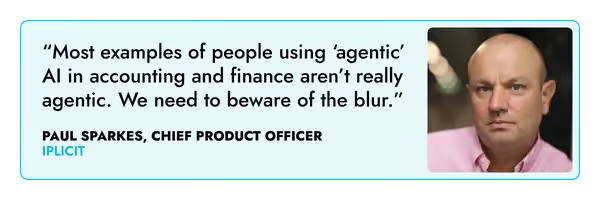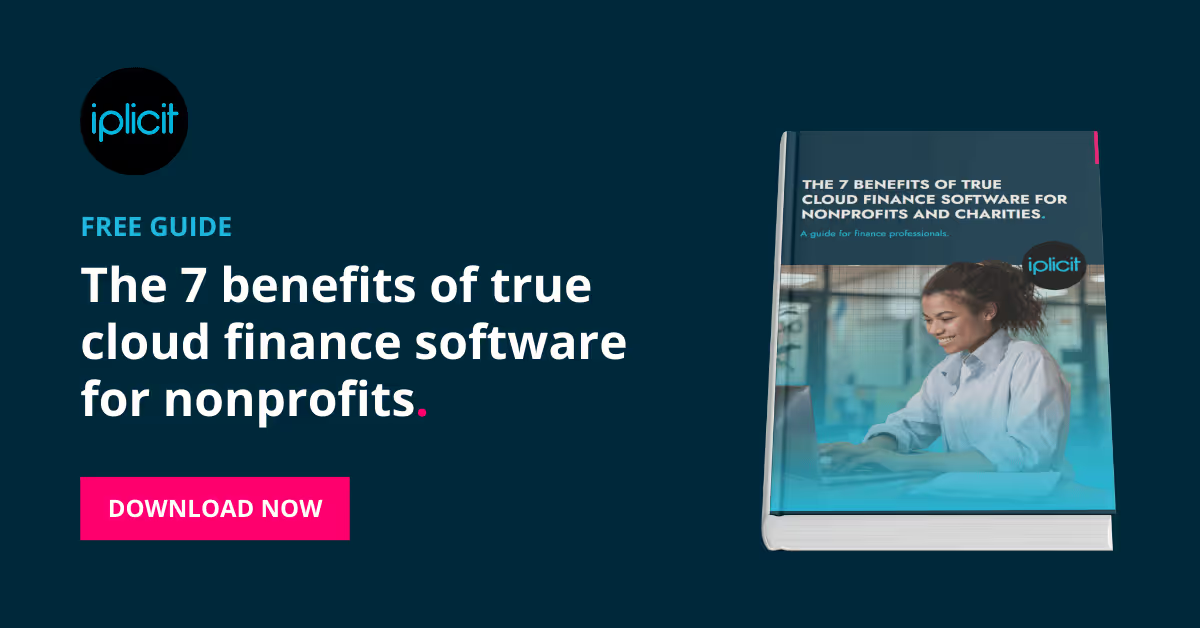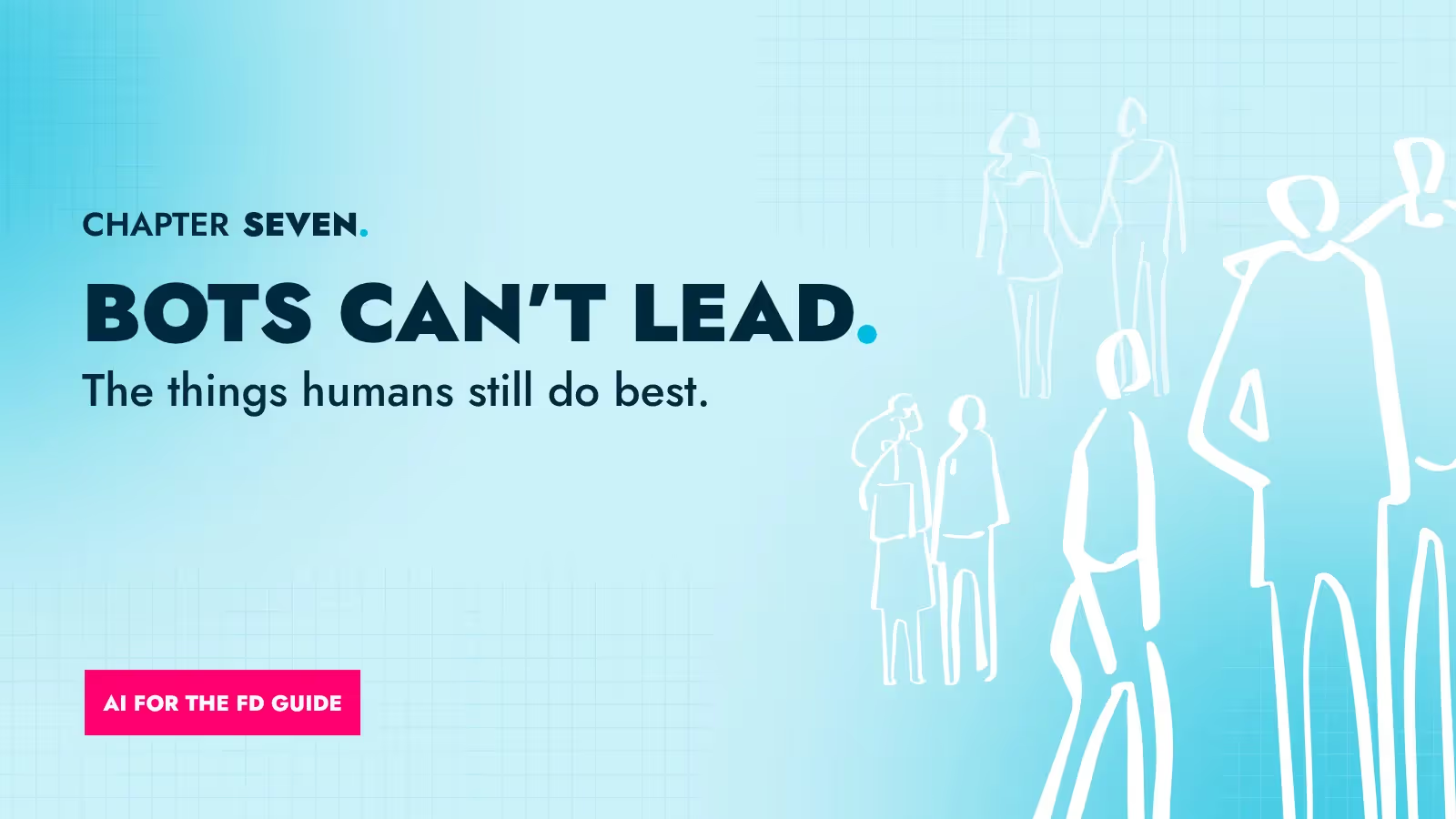Meet my agent: Your introduction to agentic AI
Get to grips with agentic AI and discover how autonomous systems are evolving from helpful assistants to proactive tools that can take action, run tasks and specialise in areas of your finance function. Learn how to spot the difference between true agents and simple automations.

📘 Definitions #4
Agentic AI: Systems that can make decisions and take actions on their own to achieve goals. Agentic AI can set objectives, plan steps to reach them and act independently, often adapting as it learns.
Your electronic assistant
We’ve seen how conventional AI acts like a highly conscientious, eager-to-please researcher – fetching information, drafting reports, even giving you an argument if you ask it to.
But some highly clever people used the arrival of ChatGPT in 2022 as the signal to develop something even more powerful.
By combining the power of large language models with other tools, they sought to create electronic assistants capable of doing multiple things in different systems. The idea was that these new platforms wouldn’t only write a suggested itinerary for your trip to Corfu. They’d book you into a hotel you’d be sure to like, arrange the flights and transfers and report back to you once everything was arranged.
Welcome to the slightly science fictiony world of agentic AI.
‘We’ve reached a pivotal point’

An AI agent, then, is a tool that can go away and take action to achieve a goal that you’ve set.
Olivia McMillan, Chief Operating Officer at iplicit, says: "I think we’ve recently reached a pivotal point with agentic AI.
“AI is no longer there just to make us more effective by being our copilot; we can actually duplicate parts of ourselves to be 10 times more effective.
“ChatGPT launched its agent mode recently in the UK and within half an hour, one of our team members had it preparing a supermarket order for him.”
But how might that kind of tool work for your finance team?
Imagine asking the AI to forecast your organisation’s cash flow for the next three months, using your last 12 months of data for reference.
The agent could then carry out all the necessary tasks – both in your finance system and outside it – and deliver a report to your inbox. It could also set an alert to go off in case the available cash dips below a responsible threshold.
On top of this, AI agents integrated with finance systems can aid audit and compliance by running checks on transactions and flagging potential irregularities. They can do scenario planning by simulating a range of reactions to external events. Outside the finance system, they could prompt you to renegotiate contracts as renewal dates loom, based on market prices and your usage patterns.
Podcaster and CEO Indi Tatla says: “I know of people who’ve configured agents, trained on some base level data, that can highlight discrepancies in reconciliations and accruals and perform very specific tasks as an extension of your team.
“You will need to weigh that up against the kind of AI technology that vendors are increasingly building into their own software – but either method could automate some of the work that you might have needed an extra person to do. Which one is better remains to be seen.”
When AI mimics a human

Daniel Lawrence specialises in this field as CEO of Bots For That, which created the accounting AI agent Houbeanie.
He says agentic AI should be able to do a lot more than ChatGPT’s agentic mode.
“An AI agent isn’t a chat window. It’s a proactive and pre-emptive automation tool that has been trained on how you and your firm work,” he says.
“In accountancy, it will know the sequence of events, the accounting timetable, it’ll know your clients and the format, style and tone of your communication.
"On the second Monday of every month, it will know it has to do a particular series of tasks and it will proactively start doing those things. You won't need to schedule it or interact with it before it does that.
“Not only that, but it will be able to take multiple actions for you. So if you say, ‘What’s the balance on my tax account?’, it will go off and find that information at HMRC but also take pre-emptive actions. For example, it might tell you the tax return is due on Monday and give you the link to make the payment now and avoid penalties.”
His company’s product for accountants in practice is an example of agentic AI in action. It has “Good morning” and “Good evening” routines, which involve the agent telling the user what automations have been run, what transactions need human review, what important emails need looking at and some potential responses to those emails.
“It saves all the going back and forward, logging in and out of different systems and fetching data,” he says.
More powerfully still, an AI agent could be dedicated to a specialist field such as fees and pricing. It could review data about a client’s activity and compare it with publicly available information about pricing in that sector and region. It could then see which clients’ prices might need reviewing, draft a pricing proposal and suggest an email inviting the client for a review.
Beware the blur

Paul Sparkes, Chief Product Officer at iplicit, believes the term “agentic AI” is often used loosely to describe things that are built into some core systems.
“People often think about AI agents helping with month-end automation. But when we created iplicit, we always had automation in the architecture,” he says.
“Most of the examples I’ve seen of people using ‘agentic’ to describe things in accounting and finance aren’t really agentic. They’re automations, following a set of rules – and we’ve been doing that for five years,” he says.
“I might want the system to go through my accruals, based on a set of rules I define, and automatically reverse them. That’s a way to save huge amounts of time and people will call that agentic but it’s not. It’s an automation. Each has its place but we need to beware of the blur.”
It wouldn’t be the first time that people have applied a fashionable label to a feature to make it sound more ground-breaking than it is. Despite that, Paul foresees big advances in agentic AI, with agents increasingly integrating with finance software and other core systems.
“Microsoft has an AI agent called the Analyst, which can analyse different data sources. That could be integrated to look at your finance system data as well as the Excel spreadsheets you feed it,” he says. “But you’ll need the right security and controls, so users can only see what they’re allowed to see – otherwise you could have users seeing all kinds of salary information, for example.”
Some of this kind of functionality lies in the future – but not very far in the future. Agentic AI is likely to be something you’ll benefit from trying out soon.
Which brings us onto the subject of learning and experimenting freely but safely.
Latest guides
Want to see iplicit in action?
Book your demo and discover how iplicit can simplify your finance operations, automate manual processes, and give you real-time visibility - wherever you work.










